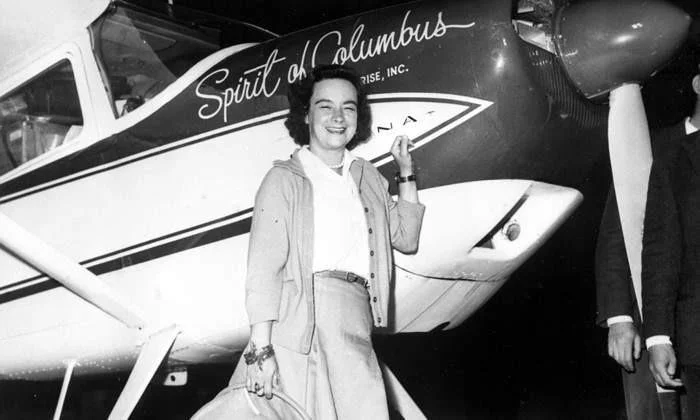Jerrie Mock: The First Woman to Fly Solo Around the World
In 1964, Geraldine "Jerrie" Mock etched her name into aviation history by becoming the first woman to fly solo around the globe. Armed with unwavering determination, a trusty single-engine Cessna 180 she nicknamed “Charlie,” and a passion for flight, Mock achieved what many thought impossible at the time. Her extraordinary journey not only set a world record but also inspired countless women to dream bigger and aim higher.
The Dream Takes Flight
Jerrie Mock’s fascination with aviation began in her childhood. Born in Newark, Ohio, in 1925, she was captivated by airplanes from an early age and dreamed of becoming a pilot. She studied aeronautical engineering at Ohio State University, one of the few women in the program, but paused her studies to marry and raise a family. Still, her love for flying never wavered.
By the early 1960s, Mock had earned her private pilot’s license and began to dream of new challenges. Inspired by the legacy of Amelia Earhart, she decided to attempt a solo circumnavigation of the globe. This decision was not about fame or fortune—it was about proving to herself and others that women could achieve greatness in aviation.
Preparing for the Journey
Mock’s airplane, a Cessna 180 named “Charlie,” was a reliable, single-engine aircraft designed for versatility and endurance. She meticulously prepared for the trip, equipping Charlie with extra fuel tanks, navigational instruments, and survival gear. Her route would span more than 22,860 miles, crossing oceans, deserts, and mountains, with stops in over a dozen countries.
Mock faced skepticism and criticism as she planned her journey. At the time, few women pursued aviation, let alone attempted such ambitious feats. Yet, Mock’s husband, Russell Mock, supported her endeavor, helping with logistics and encouraging her to follow her dream. On March 19, 1964, she took off from Columbus, Ohio, launching into the history books.
Trials and Triumphs
Mock’s flight was far from smooth sailing. The journey tested her skills, endurance, and courage. She encountered mechanical issues, navigational challenges, and unpredictable weather. One of the most harrowing moments came over the Pacific Ocean when her radio failed, leaving her to rely solely on her instincts and charts to reach her destination.
Despite these obstacles, Mock’s determination never faltered. She navigated through unfamiliar territories, including remote islands in the Pacific, bustling cities in Asia, and the rugged terrain of the Middle East. Along the way, she encountered both awe and skepticism from locals, many of whom had never seen a female pilot before.
Mock also experienced moments of joy and triumph. In Cairo, Egypt, she was greeted by enthusiastic crowds, including women who saw her as a symbol of empowerment. In Guam, a small island in the Pacific, she was welcomed by U.S. military personnel who were inspired by her courage. These moments reinforced her belief that her journey was about more than breaking records—it was about breaking barriers.
A Historic Achievement
On April 17, 1964, 29 days after her departure, Jerrie Mock landed back in Columbus, Ohio, completing her groundbreaking journey. She had flown 22,860 miles, visited 21 countries, and proven that determination and skill could overcome any obstacle. Her achievement earned her a place in the Guinness World Records and the Harmon International Aviation Trophy, among other accolades.
Mock’s feat was a milestone for women in aviation and a testament to her courage and perseverance. She became an instant celebrity, featured in newspapers and magazines worldwide. However, Mock remained humble, often saying she undertook the journey simply because she loved flying.
Legacy of a Trailblazer
Jerrie Mock’s solo flight around the world was not just a personal triumph but a turning point for women in aviation. Her story inspired countless women to pursue careers in fields once dominated by men. Mock wrote a memoir titled Three-Eight Charlie, detailing her journey and the challenges she faced.
Today, Jerrie Mock’s legacy lives on as a beacon of inspiration. Her historic flight reminds us of the power of perseverance and the importance of following one’s passions, no matter the odds. As the first woman to achieve this extraordinary feat, she paved the way for future generations of aviators and adventurers.
